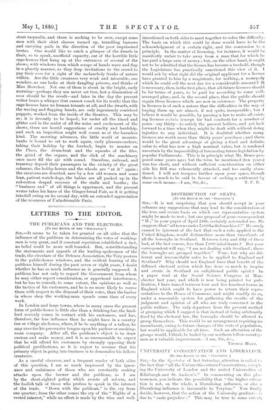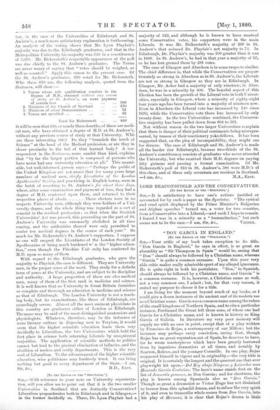UNIVERSITY CONSERVATISM AND LIBERALISM. [To THE EDITOR OF THE "
SPECTATOR.] Sin,—In the Spedator of last Saturday, attention is called to the fact that "all the Universities return Conservatives, exceFt- ing the University of London and the united Universities Edinburgh and St. Andrew's." In commenting on this phe- nomenon, you indicate the possibility that "the higher educa- tion is not, on the whole, a liberalising influence, or else a liberalising influence is favourable to Toryism." You finally decide, however, that the action of the University graduate: is due to " caste prejudices." This may be true to some extent,
but, in the case of the Universities of Edinburgh and St. Andrew's, a much more satisfactory explanation is forthcoming. An analysis of the voting shows that Mr. Lyon Playfair's majority was due to the Edinburgh graduates, and that in the Metropolitan University his-majority was 343 in a constituency of 3,619. Mr. Bickersteth's respectable appearance at the poll was due chiefly to the St. Andrew's graduates. The Tories are never weary of saying that "votes should be weighed, as well as counted." Apply this canon to the present case. Of the St. Andrew's graduates, 810 voted for Mr. Bickersteth. Who these 810 are, the following analysis, quoted from the Scotsman, will show :—
1. Voters whose sole qualification consists in the
Degree of M.D., obtained withoat any course
of study at St. Andrew's, on mere payment
of certain fees 586 2. Ministers of the Church of Scotland ... 150 3. Ministers of other Denominations ... 12 4. Voters not specified ... 62 Total for Bickersteth 810
It will be seen that 586, or nearly three-fourths, of these are medi- cal men, who have obtained a degree of M.D. at St. Andrew's, without any previous course of study at that University. Whb are these interesting 586? Do they "brandish the torch of Science" at the head of the Medical profession, or are they in closer proximity to the tail of that learned body ? A cor- respondent in the Scotsman, more candid than kind, explains that "by far the larger portion is composed of persons who have never had any university education at all." This unami- able, but well-informed, person says :—" Perhaps the public of the United Kingdom are not aware that for many years large numbers of medical men, chic fly Licentiates of the London Apothecaries' Society, and practising in English towns, were in the habit of resorting to St. Andrew's for about three days, where, after some examination and payment of fees, they had a degree of M.D. conferred upon them, and returned to their respective places of abode These electors were in no respects University men, although they were holders of a Uni- versity degree, and the whole thing was regarded as a sort of scandal in the medical profession ; so that when the Scottish Universities' Act was passed, this proceeding on the part of St. Andrew's University was summarily abolished in all time coming, and the authorities thereof were only permitted to confer ten medical degrees in the course of each year." So much for Mr. Bickersteth's St. Andrew's supporters. I suppose no one will suspect the Licentiates of the London Society of Apothecaries of being much burdened w: .11 the "higher educa- tion," even though the Fifeshire Univ rsity has conferred its M.D. upon so many of them.
With regard to the Edinburgh graduates, who gave the majority to Playfair, the case is different. They are University men, in the proper sense of the word. They study for a definite term of years at the University, and are subject to its discipline and authority. A large proportion of these are also medical men, many of them of the first rank in medicine and science. It is well known that no University in Great Britain furnishes so complete and thorough an education in medicine and science as that of Edinburgh. The London University is not a teach- ing body, but its examinations, like those of Edinburgh, are exceedingly severe. Almost all the most eminent physicians in this country are graduates either of London or Edinburgh. The same may be said of the most distinguished anatomists and physiologists. Whatever, therefore, may be the influence of mere literary culture in disposing men to Toryism, it would seem that the higher scientific education leads them very decidedly to Liberalism, the two Universities which hold the first place in science both returning Liberals by unequivocal majorities. The application of scientific methods to politics cannot but lead to the gradual elimination of fallacies, and the abolition of useless and costly departments. This is the very soul of Liberalism. To the advancement of the higher scientific education, wise politicians may fearlessly trust. It can bring nothing but good to every department of the State.—I am,



































 Previous page
Previous page